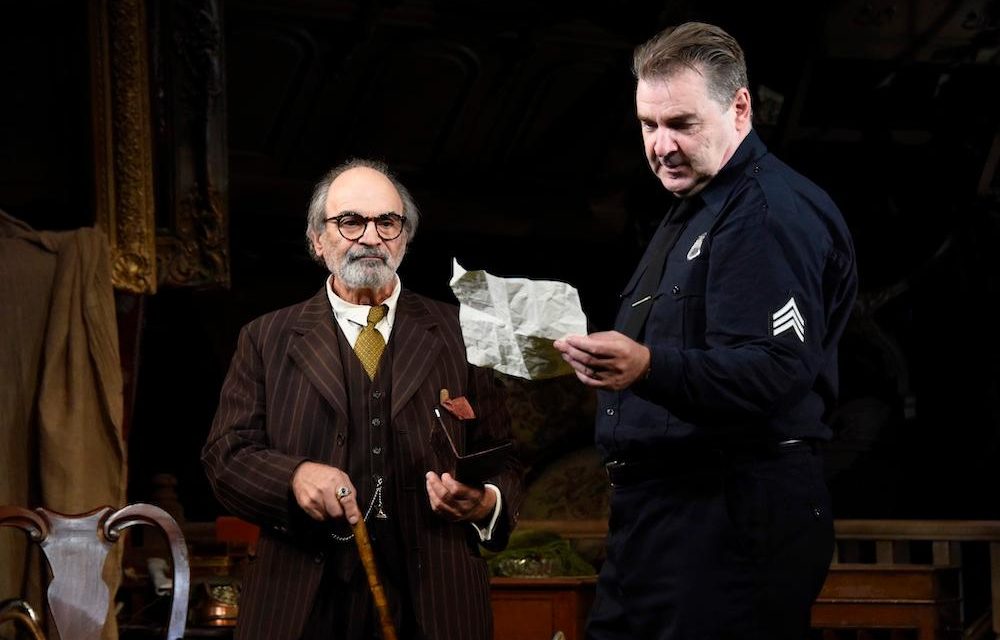All hail Arthur Miller, chief of London’s modern revivals this year. Which is odd, given that 2019 is the anniversary of neither his birth (in 1915) nor his death (2005). Never mind, theatergoers now have a good chance to revisit his various explorations of the American Dream. Would you like to see All My Sons (1947)? No problem. How about Death Of A Salesman (1949)? No problem. Or The Crucible (1953)? No worries. Then there’s the appearance of some lesser known plays, such as The American Clock (1980), at the Old Vic, and The Price (1968), at the Wyndham’s, all of which suggests that we are in the middle of a festival devoted to the playwright. So for my first expedition to Millerland this year I’m seeing The Price, which has transferred to the West End from the Bath Theatre Royal and boasts David Suchet and Brendan Coyle as its stars.
Set in the furniture-chocked attic of a New York brownstone, which was once the Franz family home and is now just a storage space in a building due for demolition, the play begins by introducing us to Victor Franz. He is an NYPD sergeant, almost fifty, and married to Esther, a smart but disillusioned woman with a bit of a drinking problem. The dynamic between them is full of her recriminations about his lack of ambition, and her wish that he retires from the force to re-train for a more managerial job. Their bickering is interrupted by the arrival of Gregory Solomon, an octogenarian Russian-Jewish second-hand dealer, who has come to value and buy the family furniture. He is a larger-than-life creation, whose amazing life story opens the vistas of our understanding of not only the Jewish diaspora but also of the multicultural character of New York in the 1960s. As they argue about the value of family heirlooms, an unexpected visitor arrives.
This is Walter, Victor’s brother, and a highly successful and well-paid surgeon. The two brothers haven’t spoken to each other for sixteen years because they have both taken different paths in life following a typically American tragedy: their father lost everything in the Great Depression of the 1930s. In response to this humiliation, his sons have had opposite responses. Victor gave up his studies, joined the NYPD and stayed at home to help his father; Walter qualified as a doctor, became rich and sent home a pittance every month. That was then; this is now: when Walter arrives, he not only questions the economic sense of Victor’s deal with Solomon but also turns up the psychological tension—he wants to settle some old scores. The result is a riveting piece of theatre.
Although this is an old-fashioned well-made play, Miller crafts it with immense skill, combining psychological realism with a state-of-the-nation analysis that shows how the American Dream can be destroyed by economic failure, as well as by personal failings. Written at the end of the 1960s, with the clash of the Vietnam war and hippie counterculture ringing in his blood, Miller’s understanding of character is completely convincing, balancing as it does personal idiosyncrasy with symbolic resonance. Victor comes across as deeply sympathetic, full of a basic integrity, but a disappointment to Esther; Walter is more energetic, more successful, more unattractive in his selfishness. One represents working-class grafters; the other middle-class high achievers. Yet both brothers have paid a huge price for their life choices.
So while Solomon haggles to get the lowest price for what looks like junk furniture, even if some of the pieces have great sentimental value in terms of family history, the two brothers have to reconcile their differences by understanding what each has lost in the choices that they made. Whether they can love each other again is a question that burns through the second half of the play, when the illusions that helped sustain the lives of both Victor and Walter are gradually torn away. Miller’s play has the dimensions of a modern tragedy, and his writing is full of even-handed sympathy for all his characters, as well as a righteous anger, in the best sense of the words, against rampant capitalism, an economic and social system that distorts and dehumanizes while exulting the great god Mammon. To say that this message remains relevant is surely unnecessary.
This 50th-anniversary production is directed with loving care by Jonathan Church, who gives a clear reading of the big themes of security versus ambition, love versus money, and human value versus the power of success. On Simon Higlett’s set, which has a huge pile of furniture precariously tiling over the stage, Suchet revisits Millerland after his award-winning performance in All My Sons in 2010 and again proves that he is a total star. Whether comic or prophetic, whether cunning or afraid, whether crabbed or light on his toes, his portrait of Solomon is memorable in all of its detail and density. In the first half with Coyle, who has a quiet heavy intensity which lights up with passion, the rapport between the two is great, so much so that on the press night there were several moments of barely controlled corpsing. Adrian Lukis and Sara Stewart are similarly excellent, the one beaming with success, the other always watchful as she follows the shifting fortunes of the two brothers. The whole cast makes Miller’s vision of the human cost demanded by the American Dream utterly convincing and utterly deplorable.
The Price is at Wyndham’s Theatre until April 27.
This post was written by the author in their personal capacity.The opinions expressed in this article are the author’s own and do not reflect the view of The Theatre Times, their staff or collaborators.
This post was written by Aleks Sierz.
The views expressed here belong to the author and do not necessarily reflect our views and opinions.


















